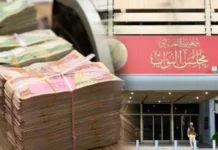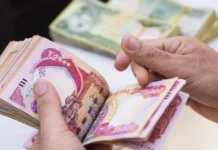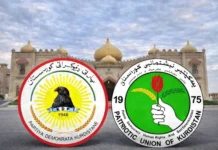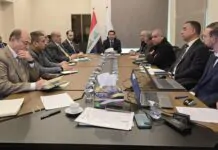Tishwash: US House of Representatives Ends War Authorizations for Iraq and the Gulf
The US House of Representatives passed the National Defense Authorization Act, which sets military policies and provides funding for the military, after a key amendment repealing the war authorizations for Iraq and the Gulf, in a vote that sparked widespread controversy between Democrats and Republicans.
The vote was 231 to 196, with four Republicans opposed and 17 Democrats joining the Republicans in favor of the legislation. The amendment includes repealing the 2002 Iraq War Authorization and the 1991 Gulf War Authorization, while also including measures that make it more difficult for presidents to circumvent Congress to make military decisions.
The House of Representatives voted 261-167 to repeal these authorizations, with the support of all Democrats and 49 Republicans, representing about one-fifth of the GOP. The use of these authorizations by US presidents has been criticized in the past, as they grant them the authority to launch military operations without a formal declaration of war.
These authorizations have been used on several occasions, most notably the January 2020 US airstrike that killed Iranian Quds Force commander Qassem Soleimani. Former President Donald Trump relied on the 2002 authorization to justify the operation in Iraq.
Analysts point out that this decision comes after a dispute within the Republican Party, as three members of the Freedom Caucus voted in favor of an amendment introduced by Democratic Representative Jim McGovern to allow it to be brought to a vote, reflecting divisions within the party over issues of military force and presidential powers.
A bill to repeal the 2002 authorization passed the House of Representatives in 2021 and was approved by the Senate in 2023, repealing both the 2002 and 1991 authorizations. This comes as part of the $892.6 billion National Defense Authorization Act, which contains other controversial amendments, including restrictions on the Department of Defense’s coverage of gender-affirming health care.
This time, there are broader disagreements over the nature of the amendments included in the legislation, after senior Democrats threatened to oppose the law if Republicans insisted on including controversial amendments, which would have forced the GOP to pass the bill without Democratic support. link
************
Tishwash: Customs: Committees formed to link Kurdistan’s ports to the ASYCUDA system. What are the implications of this move?
The General Authority of Customs revealed the formation of joint committees to connect the Kurdistan Region’s ports to the ASYCUDA system. An economic expert predicted that the move would contribute to raising annual customs revenues to more than $8 billion.
Director General of the Authority, Thamer Qasim Dawood, stated in the Official Gazette today, Thursday, September 11, 2025, that “joint committees have been formed to connect the region’s ports to the ASYCUDA system,” adding that “there has been no response yet.”
He added, “Customs offices have been opened at the checkpoints of Al-Sadd, Darman, Jemen, and Bawe Mahmoud to inspect goods entering the central and southern governorates, as a temporary solution until the connection with all ports is completed.”
For his part, economic expert Dr. Abdul Rahman Al-Mashhadani predicted that “customs revenues will double to $8.5 billion annually after the system is implemented.” He noted that “the region’s problem lies in its failure to adhere to customs tariffs and its failure to disclose actual revenues, which forces the majority of goods coming from Iran and Turkey to pass through its ports.”
He said, “The federal border crossings will adopt alternative points such as Al-Safra if the region continues to refuse, especially given the presence of 22 unofficial crossings controlled by various parties and entities, in addition to the Bashmakh crossing, which is the largest and most important.”
In this context, Al-Mashhadani noted that “the inspection points in Kirkuk and Mosul have already begun operating based on ASYCUDA data, with proposals to open secondary and mobile checkpoints to enhance oversight.” He emphasized that “implementing the system will more than double revenues compared to the current situation.” link
************
Tishwash: American organization: Al-Sudani has an opportunity to reduce Iranian influence and improve relations with Washington
The American organization Defending Democracy announced in a report published today, Thursday (September 11, 2025), that Prime Minister Mohammed Shia al-Sudani has an “opportunity” to reduce Iranian influence in Iraq and restore relations with the United States to normal.
The organization said, according to what was translated by “Baghdad Today,” that after Al-Sudani announced the formation of a committee to investigate the smuggling of Iranian oil through mixing it with Iraqi oil, he is now obligated to “investigate in a fair and impartial manner, announce the results, and take urgent measures to prevent smuggling based on them.” The organization stressed that “the investigative committees previously formed by the Iraqi government regarding Iranian activities did not announce realistic results,” describing those committees as “toothless.”
The organization called on the US government to “officially inform al-Sudani” that the established investigative committee represents an “opportunity” to end “Iran’s illegal activities in Iraq” and restore relations between the two countries to normal after their recent volatility. The organization emphasized that it is in the United States’ interest to end Iran’s “sanctions evasion” through Iraq.
The organization noted that “Iran has managed to ‘invent’ routes to smuggle oil through Iraq using ‘Iraqi businesses and companies, Iranian-backed armed militias, and even Iraqi government officials,’ generating approximately $3 billion in annual revenues, making the work of the committee formed by al-Sudani ‘sensitive.'”
The organization described the current US policy as treating the Iraqi government as “part of the maximum pressure policy on Iran,” emphasizing the need for “the Sudanese government to seize this opportunity to reduce Iranian influence and improve its relationship with the United States, and not repeat history by forming investigative committees that fail to reach results or hold officials accountable.”
It’s worth noting that “the US government announced last March the imposition of sanctions on Iraqi figures accused of working to smuggle Iranian oil using official Iraqi documents, which led to “accusations against Iraqi officials of complicity in issuing these official documents,” according to the statement. link





